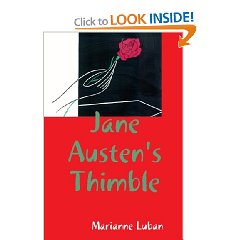I've only written one novel about ancient Egypt and it's called “The Pharaoh”s Barber”, a murder mystery set in the court of Thutmose III. I don't think too many people are aware of it much less know what it's all about. One thing is certain—this book is different. Because I, myself, dislike the stilted, Biblical language used in most novels with ancient themes—the main reason the characters seem so lifeless—you won't find anything like that in my story. I use contemporary English [within reason, of course] and, yes, people in antiquity really did swear. They had words for all the same expressions we use when we want to make an emphatic point.
This novel is not so much about king Thutmose III [although he is a main character] but about his servants, slaves to be precise, and his wives, Egyptian and foreign. There are the Canaanites—Levi, who becomes the pharaoh's barber, and Caleb, a very handsome captive of war, who was a great hero in his own land. The three Canaanite girls are the pharaoh's wives. Another slave is Tabubu, a young woman from the lands to the south of Egypt, handmaiden to the king's favorite wife, the beautiful Satiah. Other prominent characters are Neferura, the Great Royal Wife, and her son, Mehy, the heir to the throne. Here are a few quotes from the book:
Levi, upon first encountering the King of Egypt: “The young Canaanite was lying, face down, in a very large tent on a kind of carpet of the tapestries made in his homeland. Very close to his nose were the feet of the Egyptian pharaoh, propped up on an ornate footstool. The feet were encased in sandals of embellished leather. Never in his life had the youth seen such splendid shoes or such clean toes on a man.”
Levi's master, Si-Bast, explaining why a younger man needs to take his place as Royal Barber, “ He’ll mind if he gets nicked every other day, as surely as Hathor loves cows. My hand isn’t so steady any longer and my eyes aren’t what they were, either. I’m an old man and no longer fit to shave the face and head of the Lord of the Two Lands. What if I cut him and the wound becomes infected? Then he may die—and who will be the one to blame?” and “Don’t be a fool. Whoever heard of a barber who didn’t talk while he worked? Such a thing has never happened since the time of the ancient gods.”
Neferura's assessment of her lord and master: “My husband is a monster,” said the queen in the same soft tone that had never varied. “Beware of him.”
The pharaoh, attempting to put his new barber at ease, offers him some wine: “Don’t get drunk,” the ruler cautioned, grinning. “Oh, by bloody red Seth—what if you do? It’s your first day and it calls for a bit of a celebration. Here’s to your good health, Levi!”
Thutmose III on his marital situation: “Levi, I can’t divorce my wife, even though there has been no peace and harmony between us since Horus the Ancient was but a chick in the egg. She’s my father’s only daughter and must remain the queen, though I don’t go near her. I’ve found me a new wife, a real little beauty. When I was a small boy, I had a nurse who was good to me by the name of Ipu. My own mother was kept away from me, so Ipu was all I had. I hadn’t seen her for quite some time, but recently I paid her and her husband a visit. To my great delight, one of her younger daughters had grown up to look like a goddess. Satiah is her name, a true child of the moon, as her name implies, with a face as fair as the Milky Way, and no more than sixteen...”
Caleb's opinion of the King of Egypt: “That bastard pharaoh of yours—he’s going to get his someday. Six years in a row he’s come through our land—takes our wheat and wine and whatever else he can get hold of to feed his army—and hauls back to Egypt anything worth taking. What does he leave us to eat? Well, we highlanders didn’t give in as easily as you people from the south. We gave him a few good battles. Take my word on that!”
The king's son, Mehy, takes a shine to the Canaanites: “When I’m king...you can be my barber. I’m sick of just old people around me. Holy cats, am I glad you two showed up! But what about you, Caleb? You’d never fight for me, I suppose. But, you see, I only mean to defend myself. Nothing more.”
“I’ll fight for you,” said Caleb to the heir of Egypt’s throne, giving the boy’s sidelock a little tug. “Count on me.” And somehow Levi didn’t doubt that he meant it truly.
Satiah's opinion of Caleb: “Tabubu, can you believe it? It was the same man we saw from the window! All that hair was showing right through his wet shirt. I thought I’d just fall down and die right there! Isn’t he simply too splendid? Like a veritable god!”
“Yes, my lady,” Tabubu replied. “I see him. He some wet white man, alright, but not fearing nothing it looks like.”
Tabubu's opinion of the ruler: “The pharaoh was really quite handsome for a white man and looked as strong as an ox with muscular legs and a chest as big as that of a cock pigeon. Certainly, he was on the old side and running a little to fat and yet exuded more energy and virility than many younger men. More than anything else about him, the girl liked the way he spoke to the others, his servants and sailors, in a good-humored, hearty fashion—well, when he actually was in a good humor, which was most of the time. Of course, the king had no occasion to address the girl, who didn’t usually wait upon him, and didn’t appear to want to now, either.”
Tabubu's fears for Satiah: “The maidservant simply couldn’t fathom her mistress. Tabubu had been taught at an early age that one didn’t snap at the offering hand, lest it become a fist. And someday that fist would come down on Satiah with the savagery of a man who had been tested to his limit. The slave, although not knowing the pharaoh at all, instinctively knew more about him than did her mistress, for she had grown up with a man just like him—her own father. Tabubu could never have explained how she realized these men were alike, it was just something communicated to her in some mysterious fashion. If Satiah continued down the path she was treading, something worse was going to happen to her than just being sent home, but even Tabubu couldn’t be sure in what way that would occur.”
Mehy's plans for the future: “My idea is to make friends with all the rulers of the foreign lands, not fight with them. First, I’ll send them some gold as a gesture of good will and then I’ll ask them all to give me a daughter or sister—whatever they’ve got handy. I’ll become the relative of the entire world and nobody will bother me.” and “When I’m king, anybody who doesn’t want to live in my land can go—someplace else. I give the two of you my solemn oath right now this minute.”
The pharaoh's opinion of his young barber: “Listen, all you here who can understand my speech,” said the king. “Until I met this man, I wrongly imagined that no one had been subjected to a more dismal upbringing than myself. Amun-eywy is not a son of my body, but he is a child of my heart. For I know him well. You did no wrong, Levi. It was too much to ask of a son—all that which was asked of you.”
Tabubu at the court of inquest: “I go back. Nebamun waiting for me. He ask me where is my lady and I say ‘She with pharaoh.’ Nebamun grab my hair and say, ‘You lying, you black bitch! I hide near the door of pharaoh and never see Satiah go there. You better tell me where she go or I flay you hide!’ I say to Nebamun, ‘You Egyptian son of pig, beat me if you want! Then I tell my lady you make me follow her. Then you not head of this place no more!”
“Did Nebamun beat you then?”
“You see my hide flay?” Tabubu asked the Chief Interrogator, archly.
Thutmose to Neferura: “I regret that I’ve caused you to hate me. I began wrong and nothing has been right since. I’m on the chosen path now and it seems I have no choice but to keep following it. I wanted vengeance, but now the whole world seeks revenge against me and if I stop, it will get it.”
The King of Egypt has come to appreciate the good qualities of Tabubu:
“Tabubu not tired in the night,” the servant answered, approaching. “I not sleeping so good since my lady die.”
“I haven’t slept well for years. Well, sit down, then. In a chair. Let’s have a drink.”
“Too much drinking strong potions in this Egypt land,” observed Tabubu, remaining where she was at the pharaoh’s feet. “In my home we drink milk—very good for people.”
“Milk!” The king shook his head, chuckling.
“What so funny, pharaoh? A little warm milk and you go to sleep.”
“Perhaps another time, Tabubu. I don’t keep any milk here.”
“We can get a cow,” said the girl, hopefully. “Tabubu knows how to take care of cows.”
“I’ll order one for you to milk,” the pharaoh said, smiling indulgently. “Anything else?”
“A little pair of shoes, maybe? But not Egypt ones. Shoes like those foreign land girls got what can keep feet warm."
“Very well. What else?”
“Um…a wig? Long hair very nice!”
“Yes, why not? Should I get some paper and make a list?” The ruler winked at Tabubu and was rewarded with a show of her beautiful teeth.
“You much amusing, king. But you not looking so good. No shaving, no sleeping, no eating—just sitting in the night making a bad face and watching the wall, I think. Good thing nobody making a statue from you now. People say, ‘What pharaoh of Egypt is this? We not know this man!’ Hah! You want look at that wall? Tabubu show you something there. Wait!”
The girl positioned a lamp on a table and, using her hands and arms in an astonishingly clever fashion, caused the shadows of the various beasts and birds of her native land to cavort before the smiling king.









No comments:
Post a Comment